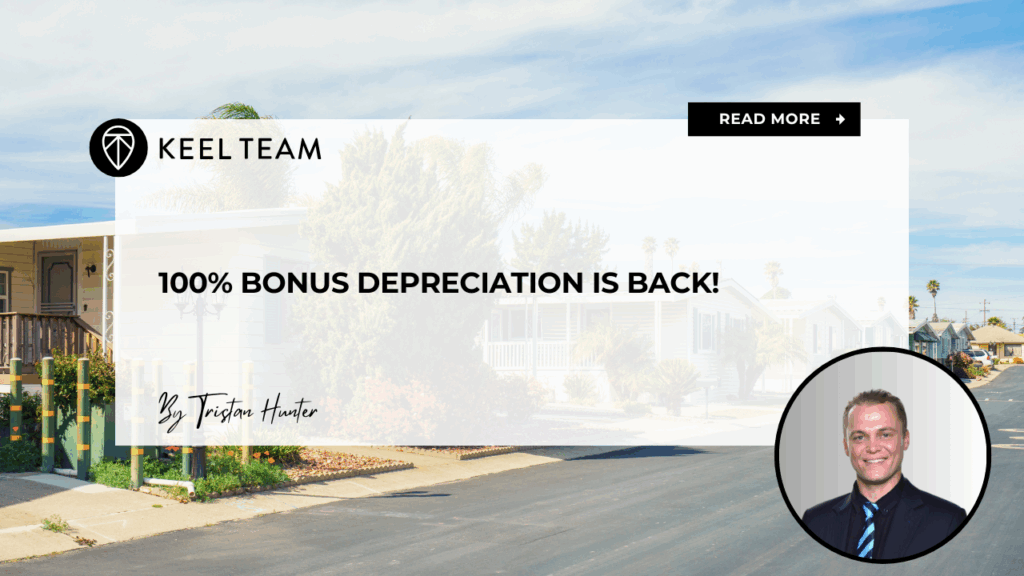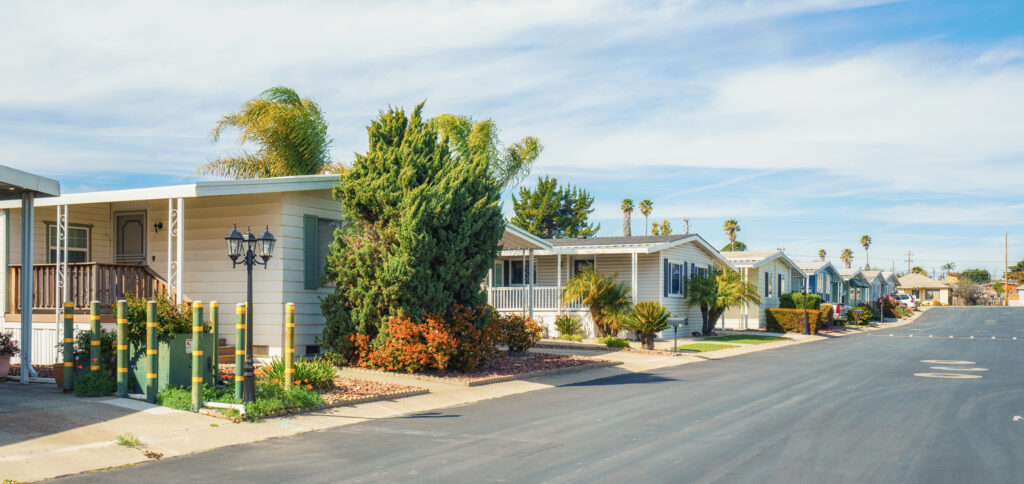100% Bonus Depreciation is BACK!
-
 Tristan Hunter - Investor Relations
Tristan Hunter - Investor Relations

The return of 100% bonus depreciation—revived in what’s being referred to as the “One Big Beautiful Bill”—could reshape how mobile home park investors evaluate deals in 2025 and beyond. While no tax benefit can ever be guaranteed, understanding how this incentive might apply to a typical mobile home park acquisition can help investors make more informed decisions.
Let’s explore how 100% bonus depreciation could influence a $1 million mobile home park purchase, based on real-world passive-loss-to-equity ratios we’ve seen on qualifying deals.
What Is Bonus Depreciation?
Bonus depreciation allows investors to accelerate the tax deduction for certain assets. Instead of depreciating those assets over several years, qualifying items can be deducted in full in the first year of ownership. These deductions help offset taxable income—specifically passive income from real estate and similar sources.
Historically, bonus depreciation fluctuated over time. The Tax Cuts and Jobs Act of 2017 introduced 100% bonus depreciation, but this provision started phasing out after 2022. Now, it looks like it might be making a comeback through proposed legislation, creating new buzz for investors across asset classes—including mobile home parks.
Why Bonus Depreciation Matters for Mobile Home Parks
Mobile home parks often include a unique mix of depreciable assets, including infrastructure, utility systems, paving, fencing, signage, and other improvements. While the land itself isn’t depreciable, a cost segregation study can help carve out these short-lived assets to accelerate depreciation.
Because many of these components qualify for bonus depreciation, mobile home parks stand out as strong candidates for this tax strategy. The result? A potential boost in first-year paper losses that can be used to offset passive income—sometimes even in other real estate holdings.
Again, this doesn’t guarantee any particular tax outcome, but it opens the door to some compelling possibilities.
A Theoretical $1M Mobile Home Park Acquisition
Let’s walk through a simplified example to show how this might look in practice. Assume the following structure for a mobile home park deal priced at $1,000,000:
- Purchase Price: $1,000,000
- Capital Structure: 70% debt / 30% equity
- Closing Costs Allocation: 5% additional equity
- Total Equity Invested: $350,000
- Bonus-Eligible Allocation: 55% of cost basis ($550,000), based on a cost segregation analysis
This example assumes the mobile home park includes a healthy mix of infrastructure and improvements, allowing 55% of the total purchase price to be eligible for bonus depreciation.
Download our FREE eBook on the Top 20 things to know BEFORE investing in mobile home parks!
Comparing 40% vs. 100% Bonus Depreciation
Under the previous tax law (which provided only 40% bonus depreciation), the first-year depreciation for this $1 million deal might look like this:
- Bonus Depreciation (40% of $550,000): $220,000
Now let’s compare that with the proposed return of 100% bonus depreciation:
- Bonus Depreciation (100% of $550,000): $550,000
That’s more than double the first-year depreciation, simply by applying the accelerated rate.
Framing It in Terms of Equity
To make this more relatable, we can translate the depreciation into a “passive-loss-to-equity” ratio. This tells us how much first-year depreciation might be realized for every dollar invested in the deal.
- Under 40% Bonus Depreciation:
$220,000 / $350,000 = $0.63 per $1 of equity - Under 100% Bonus Depreciation:
$550,000 / $350,000 = $1.57 per $1 of equity
This means that for every dollar potentially invested in this mobile home park, an investor might see $1.57 in paper losses in year one. These losses could then be applied against passive income—subject to tax law limitations and individual investor profiles.
Why Passive Losses Matter
For mobile home park investors with existing real estate income, passive losses can be a powerful tool. When structured correctly, they can reduce an investor’s tax burden, free up cash flow, and increase after-tax returns.
Of course, this depends on each investor’s tax situation. High earners who qualify as real estate professionals might even have broader flexibility with how these losses are used, but that’s something to explore with a CPA or tax advisor.
The Role of Cost Segregation
None of this works without cost segregation. It’s the engine that makes bonus depreciation possible by separating a mobile home park’s components into different categories of useful life. For example, instead of depreciating everything over 27.5 or 39 years, cost segregation might identify items that can be depreciated over 5, 7, or 15 years—and that’s where bonus depreciation kicks in.
For mobile home parks, items like concrete pads, underground utilities, electrical panels, signage, and fencing often qualify for shorter depreciation schedules. And when they do, bonus depreciation can bring those deductions forward into the first year.
It’s not automatic, though. Investors must actively commission a cost segregation study, usually through a qualified engineering-based firm. It’s not a small decision, but for larger deals, it can unlock significant tax benefits.

Flexibility for Passive Investors
Mobile home park investments often attract passive investors through syndications or joint ventures. For those investors, the appeal of bonus depreciation lies in the potential to offset income from other passive sources.
If an investor receives a $50,000 K-1 allocation of passive income from another deal, a paper loss from this mobile home park investment might help reduce that taxable income—or even wipe it out completely. While it doesn’t create a refund by itself, it might help keep more money in the investor’s pocket come tax season.
That said, there are limits. Passive losses can typically only offset passive income unless certain exceptions apply. Investors should always work with professionals to understand how the numbers shake out in their specific situation.
Why This Matters Now
The possible return of 100% bonus depreciation isn’t just about saving on taxes. It affects how investors underwrite deals, how sponsors present opportunities, and how cash flow is analyzed. When first-year tax benefits increase, after-tax returns can potentially look more attractive—even if net operating income stays the same.
For mobile home park operators, this tool might offer another way to add value to investor offerings. It could also help investors make more strategic decisions about when and where to deploy capital.
Of course, this assumes the law actually passes. And even if it does, not every deal will qualify for the same allocation, nor will every investor receive the same benefit. It all comes down to how each mobile home park is structured and what the tax code allows.
Final Thoughts
While 100% bonus depreciation can’t be treated as a magic wand, it might offer a meaningful advantage for mobile home park investors—particularly those looking for passive income and long-term tax efficiency. The $1 million example above is just a simplified case, and no two deals are alike. Cost segregation results can vary. So can investor eligibility. But if this legislation passes, it could be worth exploring how bonus depreciation might fit into your overall investment strategy.
As always, consult with a CPA or tax advisor to understand how these concepts apply to your personal financial situation. Tax law changes frequently, and personalized advice is key. In the meantime, keep an eye on developments—and keep asking smart questions about how each part of a mobile home park deal contributes to your return. Good luck!
Are you looking for MORE information? Book a 1-on-1 consultation with Andrew Keel to discuss:
- A mobile home park deal review
- Due diligence questions
- How to raise capital from investors
- Mistakes to avoid, and more!
Disclaimer:
The information provided is for informational purposes only and is not investment advice or a guarantee of any kind. We do not guarantee profitability. Make investment decisions based on your research and consult registered financial and legal professionals. We are not registered financial or legal professionals and do not provide personalized investment recommendations.

Tristan Hunter - Investor Relations
View The Previous or Next Post
Subscribe Below 👇





